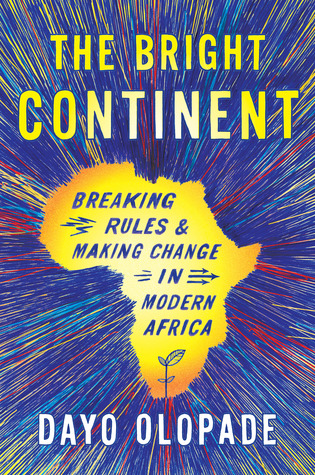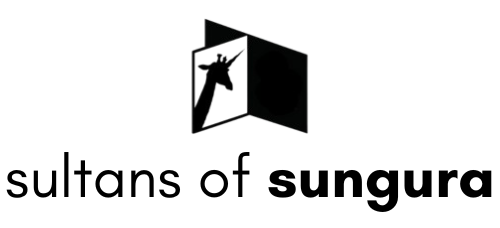 |
| Add caption |
Book: The Bright Continent
Author: Dayo Olopade
Publisher: Houghton Mifflin
ISBN: 978-0-547-67831-3
The United Nations (UN) solicits European entries for a poster design competition to mark the tenth anniversary of the Millennium Development Goals (MDGs).
The winning entry by Stefan Einarsson from Iceland merges barefooted African children, apparently queuing for food at a refugee camp, with medium shots of G8 (EU, France, Germany, Italy, Japan, Russia, UK and US) leaders.
The caption “Dear world leaders, we are still waiting,” runs across the digitally manipulated image, juxtaposing power and poverty.
This 2010 image epitomises Western media echo chambers, development agencies and capitalist institutions’ framing of Africa as a helpless continent, “the white man’s burden,” forever condemned to stretch desperate hands to Babylon.
“The Bright Continent: Breaking the Rules and Making Change in Africa” is a forceful rebuttal of this narrative. Dayo Olopade, a Nigerian-American journalist, gleans a range of anecdotes from the field to present the case for an Africa which is taking strength from within and rising to be one of the formidable centres of the 21st century.
“A panel of UN judges validated the biggest lie in modern history: that poor and passive Africans exists only in the shadow of Western action,” Olopade refutes the poster in her opening chapter titled “Orientation.”
This figment of Western fantasy is just the launchpad into an extensively argued case for domestic agency. “If you have read other ‘development’ books, it’s easy enough to get that impression (of an Africa dependent on white benevolence),” Olopade observes.
“Even as popular discourse begins to question the logic of foreign assistance to the region, the conversation remains focused on how ‘the West’ can improve its performance,” she laments.
“Familiar voices write prescriptions for everyone, from the leaders of the G8 to the infantry of the World Bank to the heads of landlocked countries like the Central African Republic.
Though many have spent decades examining the various ruts and bottlenecks in economic growth, it is rare to hear about what ordinary Africans are going to do to help themselves,” writes Olopade.
Africa is neither the Dark Continent whose best part is to bask in Western lamp-posts nor the backyard of civilisation dappled with trouble spots. On the contrary, Olodape presents a Bright Continent powering to the fore with vast possibilities.
Olopade, who has covered global politics and development policies for the “Atlantic,” the “Daily Beast,” “Foreign Policy,” the “New Republic,” the “New York Times” and the “Washington Post,” spent years in various sub-Saharan countries, coming to terms with the everyday struggles, frustrations and triumphs of ordinary people.
These stories come to life in the book, thanks to Olopade’s breezy narrative style and her meticulous handling of details. In spite of the level at which she pitches her debate, the diction is consistently down-to-earth and the stories human-centred.
Olopade contests the appropriation of formalistic, GDP-centric indices in assessing Africa’s place in the 21st century. Characterising Africa through top-level lenses, she argues, ignores the agency of everyday man and woman in getting on with life against adverse settings.
Her gripe is not just directed at the failure of offshore development but also African governments. She observes that leaders have, by and large, failed the continent, perpetuating a system of corruption, neglect and make-up rhetoric.
Yet the people survive and thrive in spite of the institutional sabotage. The heroes of “The Bright Continent” are not the grand debaters in the Pan-Africanist square but ordinary people who fend for their families and raise empowered generations in failing economies.
These include Benson Muthame, Gladys Mwande and their six children. The security guard and his family grow maize and raise chickens at a commercial scale on an abandoned colonial home situated at a busy intersection of Nairobi, despite lacking a title to the land.
Olopade marvels at their nerve: “The family has no official rights, supports, or farming expertise but like millions of subsistence farmers in Africa, found a way to make one (borrowed) acre count for something,” she says.
“Their quiet rebuke and commitment is a direct rebuke to the UN poster, and a great example of bold opportunism that makes Africa’s development trajectory so different and exciting,” she says.
She notes that there are different, mostly wrong, angles for perceiving such obscure sites as Benson and Gladys’s adopted home: to adjacent homeowners, an abandoned eyesore; to government planners, criminal trespass.
For Olodape, Africa cannot be rated through the performance of the ruling elites but through the resilience of its disenfranchised majorities. These are the demographics which people Olodape’s optimistic book.
“Sharing these hidden triumphs is the best way I know to respond to the depressing top-level narratives that have held the region back…Stories can help to challenge the bad news occupying a thin column in a Western, or scrolling across the lower edge of a cable news broadcast,” she says.
“The Bright Continent” retraces European explorers’ search for the Nile foreign correspondents’ sensationalist coverage of continent, taken to scale Henry Morton Stanley’s 1878 rendering of the Africa “dark continent,” a phrase which has since stuck.
The mistakes of history included not just condescending narratives but also ungeographical maps, mistakes equally occasioned by disregard of Africans.
Olodape says these mistakes are being perpetuated by development agencies whose desktop solutions for Africa falter for being steeped in stereotypes at the expense of real interaction with the people on the ground.
Development discourse informed by a messianic complex rather than consultation – New African gave short shrift to Band Aid in the same spirit earlier this year – is good for the ego for the ego of the agent rather than the recipients.
Her book proposes four platforms for assessing development in Africa – the family map, the technology map, the nature map and the youth map.
The family is a strategic entity in Africa’s communalistic society – as opposed to other individualistic cultures – and its cohesive function important in ensuring that success is shared and upward mobility guaranteed.
Technological penetration is another game-changer in Africa. “Since the late 1990s, the continent has become a $56 billion mobile phone ecosystem, with over half a billion subscribers; there are now 10 times as many cell phones as landlines south of the Sahara,” Olopade presents the picture in Buzzfeed.
“In 1999, less than 10% of Africans lived in areas with mobile phone coverage. Today, that number is more than 60%. Those owning phones were clustered mainly in Arab North Africa and South Africa; by 2012, 650 million people in sub-Saharan Africa – from tiny Gabon to sprawling Sudan – had subscriptions,” she writes.
Information and communication technology is not just fertile ground for job-growing start-ups but also the democratisation of information and knowledge, resources central to any economic endeavour.
Africa also enjoys a vast array of natural advantages, a minimal carbon footprint, abundant resources which can translate to fortunes, given determined efforts to beneficiate, capacity to generate energy and an environment which favours good health.
The youth, accounting for a vast majority of the African population are a dynamic and energetic demographic who saddle the promise of the continent.
Some of them, conscientious and technologically astute, are using their skills to compensate for the failure of the system to protect its citizens.
The heroes of “The Bright Continent,” including Usahidi, a citizen media solution incepted to fight political violence in Kenya.
Olopade gives it up to the enigmatic defender of the people, Ghanaian journalistic Anas Aremeyaw Anas. Recently featured in the New Africa’s “100 Most Influential Africans of 2015,” Anas’s disruptive trail reduces the manga “City Hunter” to a joke.
The enigmatic journalist is credited for “dishing up some of the most fearless investigative stories in Africa – from timber smuggling in Sierra Leone, to the horrendous world of witchcraft deployed against and killing albinos in Tanzania and much more,” New Africa reports.
His crowning achievement is, however, his recent documentary “Ghana in the Eyes of God.” Secretly recorded footage features major players in his country’s judiciary taking bribes from criminals, some of them alleged murderers, and releasing them from the legal dragnet.
Youths like Anas and many more heroes in “The Bright Continent” warrant optimism for Africa. While Africa has an observable record of governance and humanitarian problems, her people are not passive sufferers but intelligent and enterprising solution-brokers.
Foreign aid remains important, particularly in the areas of food security and the fight against disease epidemics but must be informed by exhaustive consultations on the ground as opposed to stereotypes and desktop solutions.

